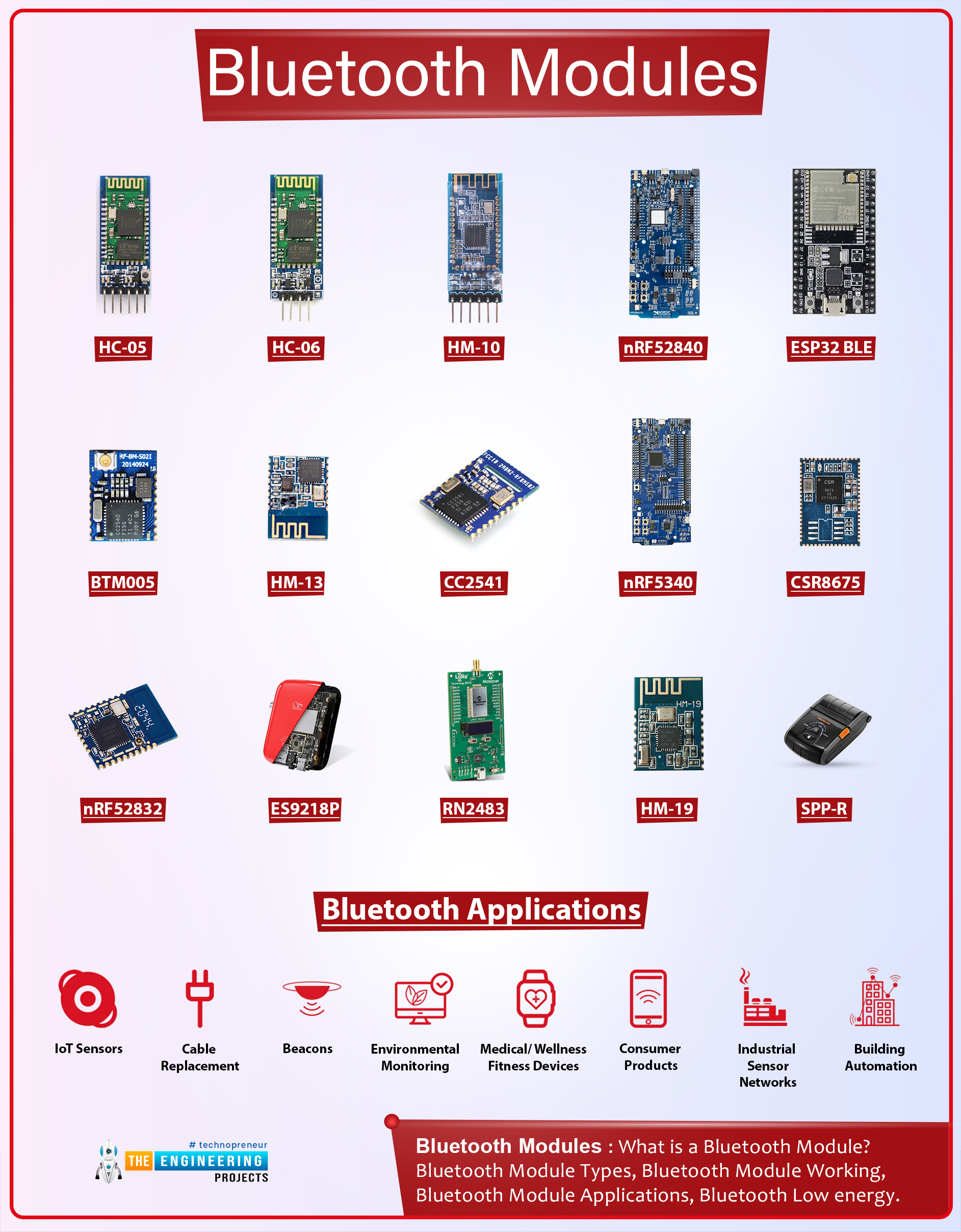
Hi students! I hope you are having a productive day. Technology is all about sharing information through different means to utilize it in a better way, and today, we are discussing an important and basic one of that has been the trend for years and has made the devices live and connected. Our motto is to discuss the basic concepts of the Bluetooth module, but we’ll try to keep things simple, to the point, and informative so you have the best knowledge.
In today’s article, we are going to study Bluetooth and its modules in detail. We’ll learn about the basic introduction of these modules and study their types in detail. We’ll see different modules with their applications and also discuss the use of particular types of modules in different fields of life. In the end, we’ll examine the workings of these modules and see how we will see these modules in the future. Let’s start learning the first point:
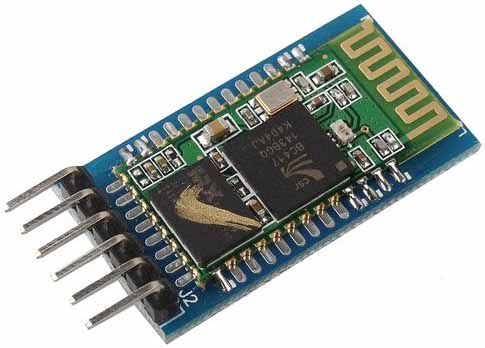
Bluetooth Module Introduction
The Bluetooth mechanism is one of the earliest wireless technologies that has revolutionized the communication process on devices. This technology works only in the equipment that was designed to do so during the manufacturing and design process, and the modules fit into the internal structure. In modern digital communication, Bluetooth modules are vital components and are incorporated into several devices to provide the easy transfer of data from one device to another. These modules are introduced as:
"A Bluetooth module is a specialized chip that is designed to wirelessly connect two compatible devices for communication, and it does it using its low energy wave feature."
These modules act as the interface between the microcontroller and the devices. The scope of these modules is not just limited to smartphones and laptops but also includes multiple types of devices, such as watches and households that use Bluetooth modules to share data. For instance, the air conditioners at home have Bluetooth modules to share details about temperature and other parameters. This not only shares the data but also contributes to controlling the devices without any physical connection with them.
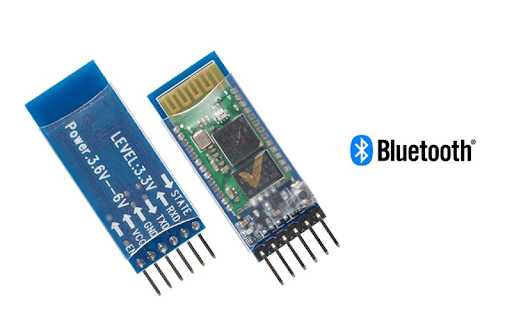
Examples of Bluetooth Modules
Before moving on to the types and other details, I want to share the modules' names and their applications, which will help you understand the workings of these modules.
The new models of these modules are frequently released every year, but some important models that are extensively used are mentioned in the table given below:
Module Model |
Type |
Applications |
HC-05 |
Classic |
|
HC-06 |
Classic |
|
HM-10 |
Classic |
|
nRF52840 |
BLE |
|
ESP32 BLE |
BLE |
|
BTM005 |
BLE |
|
HM-13 |
Dual-Mode |
|
CC2541 |
Dual-Mode |
|
nRF5340 |
Dual-Mode |
|
CSR8675 |
Audio Streaming |
|
nRF52832 |
Audio Streaming |
|
ES9218P |
Audio Streaming |
|
RN2483 |
Long-Range |
|
HM-19 |
Long-Range |
|
SPP-R |
Long-Range |
|
Bluetooth Modules’ Types
The reason why Bluetooth modules are used on multiple types of devices is because of their versatility. The popularity of these modules has encouraged designers to create different types, and out of these, the most important ones are mentioned here:
Bluetooth Classic Module
The first Bluetooth classic module was developed in the late 1990s and soon operated on 79 channels. The Bluetooth Classic was formally known as the Bluetooth or Bluetooth EDR. It is an older networking standard that was designed according to IEEE 802.15.1. Although it was an amazing module at the time, with time, it has enhanced its capability and scope; therefore, it is still used in devices. The features of this module are listed below:
Bluetooth Classic Features
It has a high data rate and can transfer up to 3 Mbps, which makes it suitable for applications that require a high bandwidth rate. This rate is significantly higher than some other modules, such as the Bluetooth LE.
It is operated from a long distance in ideal conditions because it has a range of 330 feet, which is 100 meters. This is the plus point of using this module multiple devices can be occupied in this long range.
This module can ignore the interference of different devices and create a connection with the required device, which makes it a good choice.

Bluetooth Classic Applications
Based on its features, the Bluetooth Classic can be used in different applications, such as:
Bluetooth Classic in Audio Streaming
Audio streaming is the most prominent example of the Bluetooth Classic because of the structure of this module. It works on different profiles that decide the features of the connection. For audio streaming, the relevant profiles are mentioned here:
Advanced Audio Distribution Profile (A2DP): This profile is responsible for high-quality audio streaming from one device to another. Hence, when this feature is required, the A2DP profile of the Bluetooth module is active.
Audio/Video Remote Control Profile (AVRCP): This profile is active when playback functions such as play, pause, and skip are required by the source device.
Bluetooth Classic for File Transfer
This mode of Bluetooth is also used to share files, such as images, videos, audio files, etc., from the source device to the destination. For this, it uses the Object Push Profile (OPP) profile, which is specifically designed for simple file transfers. This is a more user-friendly way of sharing files than using wires.
Bluetooth Classic for Serial Communication
For serial communication, the Bluetooth Classic uses another profile named Serial Port Profile (SPP). This profile facilitates the emulation of the serial port of a device using Bluetooth. In this way, the device establishes the connection wirelessly through a virtual serial link. This profile is usually active when serial communication is required for data sharing between two computers or other embedded devices. This is a useful feature in different cases where flexibility is required for data sharing.
Bluetooth Classic in Wireless Peripherals
Bluetooth does not only share data wirelessly, but it also helps to connect peripherals without any physical connection. This is a big relief because multiple peripherals not only create a messy look but there is always the risk of wire damage as well. Connecting peripherals like mice, keyboards, speakers, etc. are more reliable and energy efficient.
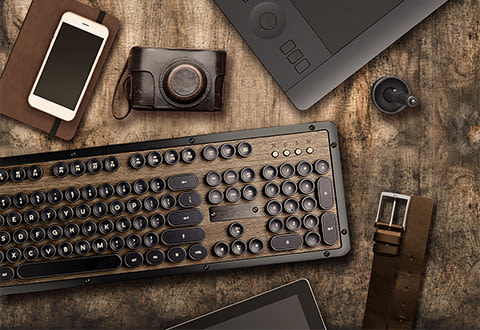
This type of connection is widely adopted and has contributed to the elimination of the need for cumbersome cables. As a result, the connection is more convenient and enables a clutter-free environment. Hence, Bluetooth Classic is extensively used in the updated peripherals, therefore providing convenience.
Bluetooth Classic in Mobile Printing
Mobile printing is a trending application of Bluetooth Classic that establishes connections with devices such as smartphones, tablets, and other Bluetooth-enabled devices. On-the-go printing is a convenient way to effortlessly send printing jobs from mobile devices to Bluetooth-enabled printing devices. This application is being used at different scales, either for personal use or for professional applications.
Bluetooth Low Energy
Bluetooth Low Energy is also known as BLE, and this version operates on 40 channels only. This is a relatively flexible version of its predecessors. It's a power-conservative module for the personal area network (PAN). It uses radio waves in the 2.4 GHz band and consumes a minimal amount of electricity; therefore, it is suitable for devices that require a continuous Bluetooth connection.
It supports the broadcasting of mesh technology and is essential for creating large-scale networks. This module is designed to keep the periodic, short bursts of long-range radio connections in mind and, therefore, has a great scope in the field of battery-oriented devices.
Bluetooth Low Energy Features
Here are some other important features of this module:
- It is designed to work in devices that run continuously for months and even years; therefore, it consumes much less energy than other modules and is considered ideal for devices such as wearables and other compact devices.
- It is only suitable for PANs and has a relatively low range of 30 meters (in ideal condition), which is lower than the previous case (Bluetooth Classic).
- As it is designed for battery-oriented devices, therefore, it can make the connection instantly. This feature helps it consume less energy because of the low-range connections.
- This module can transmit a small amount of data, such as the reading of the sensor, notifications, and other configuration settings. The duty of this module is to send the data at a rate of only 1 Mbps, which is less than the Bluetooth Classic, but it is enough for the applications for which it is designed.
Bluetooth Low Energy (BLE) Applications
Here is a list of the basic applications where the BLE is extensively used:
It transmits data from the fitness trackers and wearables and provides information like heart rate, number of steps users have taken, etc. Because of their low power consumption and small size, these modules are extensively used to connect Bluetooth-enabled devices with wearables and allow the monitoring of health metrics such as heart rate, steps taken, and distances covered.

It is a popular way for data sharing between smart home devices, such as thermostats and air conditioners. Here, it is useful because of the quick connection and low power usage, so it may provide the information from these devices to the user consistently. In this way, it provides a reliable connection to check the home climate and, therefore, helps in its regulation.
BLE beacons effectively transmit location information for indoor navigation and proximity marketing. The efficient data transmission capabilities to nearby devices help the BLE stand out in the first position among other options for data sharing in this regard.
It is used in medical devices and sensors. With the advancement of technology, large and bulky devices are converted into smaller and more efficient ones, and the connection of these devices with the computer is now easy because of the advanced Bluetooth modules. It is employed in wearable devices that allow the medical staff to send the health parameters to the computer, where the printing of the report and detailed examination can be done.
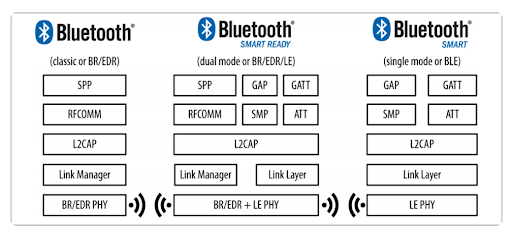
Dual Mode Bluetooth
Dual-mode Bluetooth is a versatile Bluetooth chip that has the functionalities of both (BLE and Bluetooth Classic) and offers the advantages of both of these. It incorporates features like the wide range of 3 Mbps at 100 meters and the low power consumption and small data pack that make it ideal for a great number of applications.
This module has made the applications simpler; before this, separate modules were used to get such features. It not only makes the design simple and small but is also more cost-friendly the user simply has to switch between the modes through the device.
Dual Mode Bluetooth Applications
As expected, the application of this module is a combination of those mentioned before in this article. Here are some cases where Dual Mode Bluetooth is the most suitable choice:
Dual Mode Bluetooth in Automotive Integration
Dual Mode Bluetooth is a dominant technique for hands-free audio calling in vehicles. When working as the Bluetooth Classic, it can be used in the safe calling system in vehicles. The drivers simply connect their smartphones and other devices with the vehicles’ calling system and receive the calls without any discomfort. It is a life-saving feature in different cases.
The user can also share the files with the vehicular system, and for this, the BLE mode is efficient. The small packets of data that are transmitted consume very little energy, and this continued connection helps to provide a more user-friendly experience.
Dual Mode Bluetooth in the Internet of Things (IoT)
The mode of IoT working is to create connections between different devices and allow them to work as a closed system; therefore, Bluetooth is widely used here. These devices require continuous connection as well as fast information sharing, so dual-mode Bluetooth is the best option for IoT. It allows a diverse array of IOT applications and allows devices to seamlessly switch between high-speed data transfer (a characteristic of Bluetooth Classic) and energy-efficient, intermittent communication (a characteristic of BLE). In short, it provides the perfect balance between data sharing and continuous communication. As a result, it can provide a strong connection between devices, sensors, actuators, and other IoT system components.
Dual Mode Bluetooth in Gaming
Gaming is one of the most trending fields nowadays, and here, dual-mode Bluetooth is making the gaming experience more convenient. It provides a seamless connection between the gaming peripherals, such as controllers, headphones, and other accessories. The dual functionality of this Bluetooth mode ensures low latency and high-speed data transfer, which are the basic features of a smooth gaming process. The gamers, in this way, experience a more immersive and customizable gaming environment.
The wire-free and more dynamic gaming system is not only more convenient and smooth but also helps in better gaming performance.
Here is the table that compares these three modes of Bluetooth modules:
Feature |
Bluetooth Classic |
Bluetooth Low Energy (BLE) |
Dual-Mode |
Data Rate |
Up to 3 Mbps |
Up to 1 Mbps |
Up to 3 Mbps (Classic), Up to 1 Mbps (BLE) |
Range |
Up to 100 meters (330 feet) |
Up to 30 meters (100 feet) |
Up to 100 meters (330 feet) (Classic), Up to 30 meters (100 feet) (BLE) |
Power Consumption |
High |
Low |
Varies depending on active mode |
Connection Speed |
Fast |
Slower |
Faster (Classic), Slower (BLE) |
Latency |
Lower |
Higher |
Lower (Classic), Higher (BLE) |
Security |
AES-128 encryption |
AES-128 encryption |
AES-128 encryption (Classic), AES-128 encryption (BLE) |
Supported Connections |
Point-to-point, multipoint |
Point-to-point |
Point-to-point, multipoint (Classic), Point-to-point (BLE) |
Cost |
Moderate |
Lower |
Higher |
Applications |
Audio streaming, data transfer, file sharing, and gaming |
Wearables, sensors, beacons, healthcare devices, smart home |
Flexible - any application needing Classic or BLE features |
Similarly, some other module types are related to the particular features of Bluetooth, such as audio streaming, serial Bluetooth, Long-Range Bluetooth, evaluation and development kits, and others.
Working of Bluetooth Modules
The basic purpose of these modules is to eliminate the need for wires to share data through radio waves. These modules work over short distances only, and generally, the working principles of all the modules are more or less similar. Here is the general way in which these modules are discussed below:
The modules have small antennas in them, and these are incorporated into the devices.
When a compatible device is turned on, it emits signals, which are captured by the module antenna. Once these devices are connected to the user confirmation, they can send the data and share information.
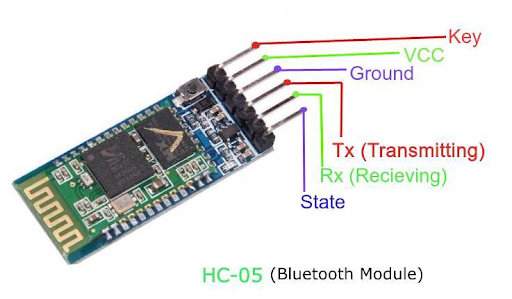
The group of multiple devices connected through Bluetooth is termed the Bluetooth network. This large network of Bluetooth devices follows the master/slave system. In this way, the master can connect more than one device and send and receive data from its slaves. On the contrary, the slave can only connect with the master and send and receive data there. There is no connection between the slave devices. The role of the master device is most highlighted in the network, and if, for some reason, the master device fails in the connection, then the whole network is disturbed.
Bluetooth Modules Future Trends
There are different connectivity technologies, and the designers of the Bluetooth modules are working hard to meet the needs of the time. In the future, the Bluetooth modules will be better with the help of the following features:
Bluetooth Modules’ Enhanced Connectivity
Right now, Bluetooth modules are less famous than other connectivity resources due to the limited connectivity of Bluetooth. Designers are working on modules that will connect instantly over a long range and transfer the data at a high rate.
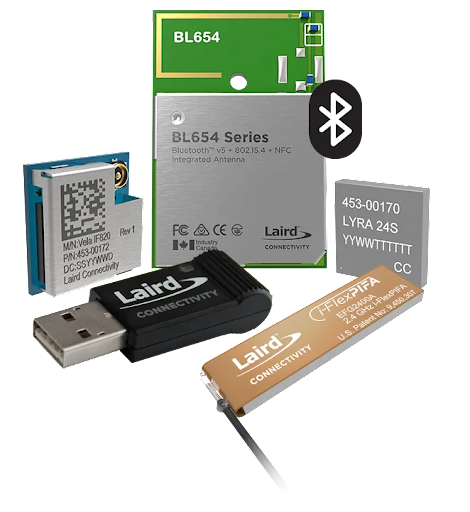
Bluetooth Mesh Network
The Bluetooth mesh network is a crucial feature that is making it more useful in fields like the Internet of Things (IoT). Designers are working on modules that can accommodate multiple components at a time. The network allows the modules to communicate seamlessly over an extended area. In the future, more powerful modules are expected for networking. Some basic examples of the elements in the mesh network are:
Smart lighting
Building automation
Large-scale sensor networks.
Bluetooth Modules with 5G Integration
5G technology is the most updated technology of this decade. The newer modules are denied in such a way that they can work closely with 5G technology. This will not only leverage the high speed and low latency, but it will also be compatible with the latest devices. The most suitable applications in the future with these modules are those wanting real-time data transformation, for instance, augmented reality (AR) and virtual reality (VR).
Some other important features of these modules that will keep them updated for the latest applications are Ultra-Low power consumption, security enhancements, compatibility with emerging standards, AI integration, miniaturization and integration, and many others.
Hence, today we have studied the fundamental concepts of Bluetooth modules, and we started with what Bluetooth is and the introduction of the Bluetooth modules. We saw that there are different types of these modules, and each of them is ideal for the particular class of devices and applications where these modules are used. We have seen a comparison of these types as well, and in the end, we examined how these modules work. Moreover, we also study the future trends of the Bluetooth modules and how the teams of designers are working. I hope you got all the points in this article that you were searching for, but if you want any other information, you can ask in the comment section.



